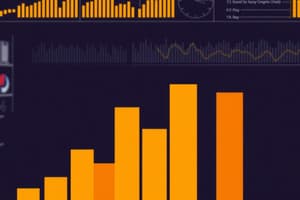Podcast
Questions and Answers
Qual é o principal objetivo dos métodos de pesquisa qualitativa?
Qual é o principal objetivo dos métodos de pesquisa qualitativa?
- Coletar dados numéricos por meio de observação, pesquisas e experimentos
- Obter uma compreensão mais profunda das atitudes, crenças, comportamentos e motivações das pessoas (correct)
- Estabelecer relações de causa e efeito entre variáveis
- Analisar tendências de mercado e preferências do consumidor
Qual é uma das vantagens da pesquisa qualitativa?
Qual é uma das vantagens da pesquisa qualitativa?
- Gera dados descritivos ricos que podem revelar padrões e temas subjacentes (correct)
- Requer menos esforço e tempo do que a pesquisa quantitativa
- Permite estabelecer relações de causa e efeito entre variáveis
- Fornece insights sobre tendências de mercado e preferências do consumidor
Qual é o principal objetivo dos métodos de pesquisa quantitativa?
Qual é o principal objetivo dos métodos de pesquisa quantitativa?
- Estabelecer relações de causa e efeito entre variáveis e identificar correlações (correct)
- Obter uma compreensão mais profunda das atitudes, crenças, comportamentos e motivações das pessoas
- Coletar dados não numéricos por meio de observação, entrevistas e grupos de foco
- Fornecer insights sobre tendências de mercado e preferências do consumidor
Qual método de pesquisa qualitativa envolve o monitoramento de mídias sociais?
Qual método de pesquisa qualitativa envolve o monitoramento de mídias sociais?
Qual método de pesquisa é mais adequado para coletar dados numéricos?
Qual método de pesquisa é mais adequado para coletar dados numéricos?
Qual método de pesquisa envolve a interação direta com um grupo de participantes para obter insights?
Qual método de pesquisa envolve a interação direta com um grupo de participantes para obter insights?
Qual é o objetivo principal dos métodos de pesquisa quantitativa?
Qual é o objetivo principal dos métodos de pesquisa quantitativa?
Qual é a principal vantagem das técnicas de análise de dados?
Qual é a principal vantagem das técnicas de análise de dados?
Qual é o principal objetivo dos grupos focais?
Qual é o principal objetivo dos grupos focais?
Quais são algumas das principais vantagens dos métodos de pesquisa por survey?
Quais são algumas das principais vantagens dos métodos de pesquisa por survey?
Qual é uma das principais limitações dos grupos focais?
Qual é uma das principais limitações dos grupos focais?
Qual software é comumente usado para análise de dados quantitativos?
Qual software é comumente usado para análise de dados quantitativos?
Study Notes
Market research is the systematic collection and analysis of data about a specific industry, market, or audience to inform strategic decision-making. It offers insights into market trends, consumer preferences, competition, and opportunities, helping businesses refine their strategies effectively. Market research has evolved over the years with the advent of digital technologies, offering a range of new research methods to complement traditional techniques. Let's explore the qualitative and quantitative research methods, data analysis techniques, focus groups, and survey methods in market research.
Qualitative Research Methods
Qualitative research methods involve collecting non-numerical data, primarily through observations, interviews, and focus groups. These methods aim to gain a deeper understanding of people's attitudes, beliefs, behaviors, and motivations. Examples include in-depth interviews, ethnography, and netnography (social media monitoring). One of the advantages of qualitative research is its ability to generate rich, descriptive data that can reveal underlying patterns and themes. However, it requires skilled researchers to interpret and analyze the data effectively.
Quantitative Research Methods
Quantitative research methods involve collecting numerical data, typically through structured observation, surveys, and experiments. These methods aim to establish cause-effect relationships and correlations between variables. They are useful for measuring the size of phenomena, estimating population parameters, and comparing different populations. Common quantitative research methods include statistical sampling techniques, hypothesis testing, and regression analysis.
Data Analysis Techniques
Data analysis techniques refer to the processes used to transform raw data into meaningful insights. These techniques range from simple descriptive statistics, such as mean, median, mode, and standard deviation, to complex predictive models, such as regression analysis, machine learning algorithms, and artificial intelligence. Some popular data analysis software programs include SPSS, SAS, Stata, Excel, Python, and R. The choice of data analysis techniques depends on the research question, the nature of the data, and the availability of analytical tools and expertise.
Focus Groups
Focus groups are group discussions led by a trained moderator aimed at exploring participants' perceptions, experiences, and opinions about a particular topic. They typically involve 8 to 12 participants and last for around 90 minutes. Focus groups are particularly useful for identifying emerging trends, testing prototypes, and generating ideas for new products or services. They allow researchers to gather detailed, open-ended data in a relaxed and interactive environment.
Survey Methods
Survey methods involve asking a sample of individuals predefined questions to gather quantifiable data about their opinions, preferences, or behaviors. Surveys can be conducted online, through mail, telephone, or face-to-face interviews. They are widely used for tracking changes in public opinion, gauging customer satisfaction, and evaluating advertising effectiveness. Surveys can be designed to capture both qualitative and quantitative data, depending on the research objectives.
In conclusion, market research methods include both qualitative and quantitative approaches, data analysis techniques, focus groups, and survey methods. Each method has its advantages and limitations, and the choice of technique depends on the specific research question, resources available, and the nature of the data required. By understanding these different types of market research methods and their applications, businesses can make more informed decisions about their products, services, and marketing strategies.
Studying That Suits You
Use AI to generate personalized quizzes and flashcards to suit your learning preferences.
Description
Este quiz aborda os métodos qualitativos e quantitativos de pesquisa de mercado, técnicas de análise de dados, grupos focais e métodos de pesquisa por questionário. Explore a coleta de dados, análise estatística, dinâmica de grupos focais e elaboração de questionários.




